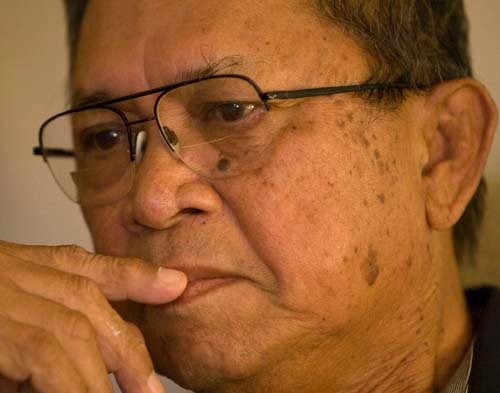As death nears, hepatitis C victim to give videotaped deposition in Desai case

One of the hepatitis C victims in the criminal case against Dr. Dipak Desai is dying, and prosecutors say they want to take his sworn videotaped deposition as soon as possible.
In court papers filed Monday, Chief District Attorney Mike Staudaher said the hepatitis C virus has left Rodolfo Meana, 76, terminally ill. Meana has bought a one-way, March 27 ticket to his native Philippines, where he plans to die. Meana came to the United States in 1997 from the Philippines following a decorated career in the military, rising to the rank of colonel. He later became a U.S. citizen.
Staudaher said he has been told that Meana is expected to pass away "sometime within the next year."
But he added: "Based on the police follow-up, it is clear that Mr. Meana’s health has deteriorated to such an extent because of his hepatitis C infection that he could in fact die at any time."
In a Las Vegas police report attached to the motion, Detective Robert Whiteley said Meana’s daughter told him that she began to care for Meana in early 2011 "when he started to fall ill due to complications created by hepatitis C."
Staudaher said Meana’s testimony can be preserved through the deposition, and he wants to be able to use it at trial if it’s needed.
Meana’s hepatitis C case is one of seven the Southern Nevada Health District genetically linked to Desai’s lead clinic, the Endoscopy Center of Southern Nevada.
Meana and five other patients contracted the deadly virus through unsafe injection practices on Sept. 21, 2007, the Health District concluded in its lengthy investigative report on the hepatitis outbreak. Another patient was infected on July 25, 2007.
All seven patients are named as victims of felony criminal neglect in a 28-count indictment against Desai, 62, and two of his nurse anesthetists, Keith Mathahs and Ronald Lakes.
The three defendants, who also are facing felony charges of racketeering, insurance fraud and obtaining money under false pretenses, are set to stand trial March 12 in the courtroom of District Judge Donald Mosley.
But the trial probably will be delayed in part because Mosley is expected to retire at the end of the month after nearly 30 years on the bench. Mosley has not put out any official word about his pending retirement.
Meana talked about his struggles in dealing with hepatitis C in a 2008 interview with the Las Vegas Review-Journal.
His biggest fear was inadvertently passing on the virus to someone else, including his wife, Linda, and his grandchildren.
"I do not want to give hepatitis to someone else," he said. "I don’t want to make an innocent so sick."
In his court papers, Staudaher said he wants to take Meana’s deposition before Meana departs for the Philippines.
There is urgency in getting Meana’s testimony because his health and memory are failing by the day, Staudaher said.
The hepatitis C virus has caused the most damage to Meana’s liver, Staudaher said.
According to Meana’s daughter, the prosecutor said, Meana has only 5 percent of his liver function and has been diagnosed with stage three kidney failure. His doctors no longer are actively treating him, and he is only being given medication to make him feel more comfortable.
The deposition won’t be needed if Meana is alive and able to travel when the trial starts, Staudaher wrote.
"However, in the event that Mr. Meana dies, is unable to travel or is of unsound mind at the time of trial, it would be a miscarriage of justice for the state to not be permitted to introduce the videotaped deposition of this witness."
In his interview with the Review-Journal in 2008, Meana remained upbeat, though the virus had begun to harm his body.
"I love the United States, being close to my grandchildren," he said. "I came here partly because it is the safest country in the world. Sometimes, though, I’ve learned even the safest country may be safe from war, but not other things."
Contact Jeff German at jgerman@reviewjournal.com or 702-380-8135.